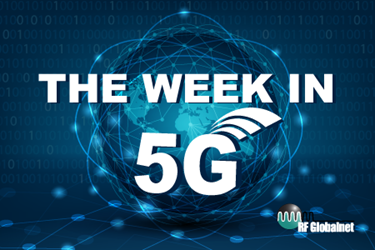The Week In 5G: 1/8/2019 – T-Mobile Makes First 5G Call At 600 MHz, Cable Companies Push "10G" Initiative
By Jof Enriquez,
Follow me on Twitter @jofenriq

T-Mobile has completed what it claims is the first 5G data call and video call at 600 MHz on a live commercial network. The company also said it carried out a tri-band 5G video call, with three users each on different spectrum bands — 600 MHz, 28 GHz, and 39 GHz.
The tests, carried out in collaboration with Ericsson and Intel, are part of T-Mobile's multi-band spectrum strategy to blanket the United States with 5G services by 2020, through a proposed merger with Sprint.
Verizon launched a 5G variant in October, and AT&T rolled out 5G services in December, albeit in select U.S. cities. T-Mobile and Sprint's combined effort represents a true nationwide rollout of the next-generation technology starting this year, according to both carriers.
In a commissioned study, T-Mobile says 64 percent of Americans believe 5G technology will be widely available this year, 57 percent are aware of 5G technology and, of those who are aware, 90 percent believe 5G will be better than 4G/LTE, reported RCR Wireless.
“This is a huge accomplishment for Neville and his team, who had a vision for nationwide 5G and are building it out the right way – across multiple spectrum bands,” said John Legere, CEO of T-Mobile. “While the other guys focus on 5G millimeter wave on a handful of blocks in a handful of cities, we’re building 5G for everyone, everywhere! And together with Sprint, we’ll add much-needed spectrum depth.”
Sprint plans to debut a standards-compliant 5G smartphone from Samsung this summer. The device will offer dual-mode connectivity to Sprint's LTE and 5G network in the 2.5 GHz spectrum, as well as support Sprint's 1.9 GHz spectrum (band 25), 800 MHz spectrum (band 26), and other LTE spectrum bands for roaming. Sprint will roll out 5G in nine U.S. cities in the first half of 2019.
"We are proud that our longstanding relationship with Samsung has delivered some of the most innovative mobile technologies to our customers over the years – and this tradition continues with 5G," said Sprint CTO Dr. John Saw. "Samsung is one of our key 5G network infrastructure Massive MIMO providers, so we are delighted that they will also deliver one of our first 5G smartphones."
At CES 2019, T-Mobile and Sprint are expected to provide a sneak peek of their future 5G network, and perhaps confirm a few upcoming 5G-capable handsets and electronic devices. CES 2019 is likely to feature more smart home appliances and gadgets, as well as enterprise services and applications on devices other than smartphones — technologies likely to be in the spotlight next month at Mobile World Congress (MWC) in Barcelona, as well.
In addition, CES 2019 will be a chance for the mobile industry to explain why 5G is so significant beyond just communications — specifically, 5G's ability to realize other equally transformative technologies like Artificial Intelligence (AI), Virtual Reality (VR) and Augmented Reality (VR), according to Tech Radar. In addition, companies will demonstrate how 5G can transform whole sectors, such as the entertainment and automotive industries.
Related, Ford announced this week that it will equip all its new U.S. models, starting in 2022, with cellular vehicle-to-everything (C-V2X) technology, which relies on 5G signals for Ford's cars to communicate with one another about road hazards, talk to stop lights to smooth traffic flow, and pay the bill automatically while picking up fast food, reported Fortune.
C-V2X is competing with a Wi-Fi technology called dedicated short-range communications (DSRC) for smart vehicle applications. DSRC is backed by General Motors and Toyota, plus hundreds of millions of dollars in R&D funding from the U.S. government. Ford believes C-V2X is the more logical choice for the automotive industry because it can ride on the buildout of 5G infrastructure.
“Our hope is that this would spur others to potentially reassess and, in other cases, decide on this direction,” Don Butler, executive director of Ford’s connected-vehicle platform, said in an interview with Fortune. “We’ve been looking at DSRC for a number of years along with Toyota, GM and Honda, so this is not a step that we take lightly in the sense of dismissing DSRC. But we think this is the right step to make given where we see the technology headed.”
Meanwhile, the U.S. cable industry is not standing idly by while the wireless carriers increasingly challenge them as traditional home broadband providers. According to CNET, the industry is pushing a "10G" initiative that, at first glance, suggests a two-fold leap of 5th generation cellular technology, which will deliver speeds 10 to 100 times faster than your typical cellular connection.
It turns out the "10G" campaign is a way to group all network upgrade efforts – aimed at upping residential speeds to 10 gigabits – under one shared umbrella, according to CNET. Presently, cable providers typically deliver one gigabit service to U.S. households. Pushing it to 10 gigabits seems like a huge improvement, except most homes’ Wi-Fi routers are not capable of 10 gigabit-per-second speeds. Moreover, lab trials demonstrate that mobile 5G can hit peak speeds at 10 gigabits per second, the same speed promised by fixed broadband networks.
Overseas, Vietnam's Ministry of Information and Communication (MIC) says it will grant test 5G frequencies to operators this year. Viettel Group is the frontrunner among operators in Vietnam to deploy a 5G network. In preparation, the company plans to build a 5G broadcasting station version 1 in 2019 and a test 5G station network by 2020, with possible deployment in 2021.
“We hope that there will be information on frequencies soon for Viettel and other operators to prepare appropriate design and equipment, in order to meet the frequency that the MIC is expected to use for 5G,” said Deputy General Director of the Group Cao Duc Thang, according to an Inquirer.net report.
